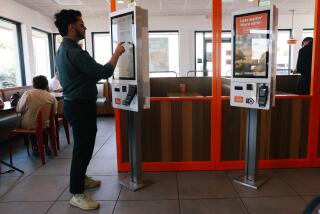Carl’s Jr. to Test Tuition Aid as Way of Retaining Staff
- Share via
In a push to persuade cooks, cleaners and cashiers to stay with the company, Carl Karcher Enterprises said Tuesday that it will inaugurate a test program at nine Carl’s Jr. restaurants to help employees pay for college educations for themselves or family members.
Carl’s, like other fast-food chains, is plagued by high employee turnover and suffers from the resulting training costs. Officials of the Anaheim-based company view the program as an employee benefit that might help it retain more of its lower-paid hourly workers.
To employees and managers alike, the tuition assistance program is a much needed boost that will help some stay in school and allow others to consider college for the first time.
‘Real Good Thing’
“This is a real good thing,” said Robert Wartenburg, 20, a shift supervisor at Carl’s State College Boulevard restaurant in Anaheim. “I go to UC Irvine, where they just raised tuition. They won’t pay all the tuition, but it’s still $350 I’ve saved (per term).”
If the pilot program is successful, the firm may make the tuition, textbook and mileage payments available to workers at all 500 of its restaurants next year, said John Kubas, vice president for human resources.
Carl N. Karcher, the 72-year-old founder of the chain, made it to, but not through, the eighth grade, said Karcher spokeswoman Patty Parks. “He was an Ohio farm boy who left school to help his family on the farm. But he’s a big supporter of education.”
The program--one of the most far-reaching in the fast-food industry--is open to all employees who work at least 10 hours a week. It can be transferred to immediate family members so that a parent or grandparent who works for a Carl’s Jr. could, for example, pass the benefit on to a child or grandchild.
The hours employees work weekly determine the amount of benefits provided. Employees working 10 to 15 hours can receive up to $125 per semester or quarter, those with 16 to 25 hours receive up to $225 and those with 26 hours or more receive up to $350. In addition, Carl’s will pay each eligible employee a book allowance of $30 per term and a travel allowance of $25 per term.
Turnover Expenses
For Wartenburg, a physics major entering his junior year in September, the help couldn’t have come at a better time. The UCI student had saved enough to make it through four years of college--if tuition had stayed put.
College costs “would have put a real crimp in my savings,” Wartenburg said, but the assistance will keep him from draining assets early. “It’s all money I can put forward for a house down payment later, for when I get out of college.”
Although the program is not expected to put much strain on Karcher Enterprises’ budget while it is being tested this year, it could rapidly become a multimillion-dollar annual expense if extended throughout the chain.
But Karcher wants to cut employee turnover expenses, a spokeswoman for the corporation said, “and if we can get a better retention rate with this program, then that will pay off for the company in the long run. It will make the program well worth the expense.”
Other Programs
Other fast-food chains offer tuition programs. Some, such as McDonald’s and Taco Bell, offer tuition aid for management employees only. Others, including Burger King, help all employees through college.
But the Karcher program differs by prepaying all or a portion of the eligible employee’s tuition.
“We have found that some of our people want to go to college but don’t because they can’t save up the tuition,” said spokeswoman Parks. “This way, they don’t have to have the money saved.”
It was that incentive that lured Claude Cheely, who manages a Carl’s Jr. in Irvine, to community college for the first time. This fall, Cheely, 29, will register for a Spanish language class at Rancho Santiago College in Santa Ana.
“I was thinking about going to college, but this is a real incentive,” Cheely said. “I want to learn Spanish, which is a major, major part of my job here. And a lot of the Spanish speakers here want to learn to speak English, so they’re going to go ahead and take English classes.”
More to Read
Inside the business of entertainment
The Wide Shot brings you news, analysis and insights on everything from streaming wars to production — and what it all means for the future.
You may occasionally receive promotional content from the Los Angeles Times.











